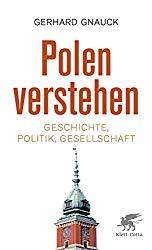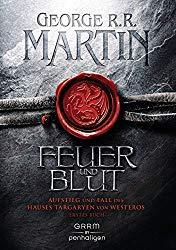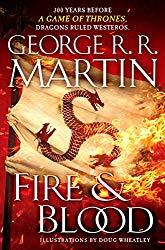Dies ist der erste einer monatlichen Serie von Posts, in denen ich die Bücher bespreche, die ich in diesem Monat gelesen habe. Je nachdem wie sich das einpflegt werde auch auch auf andere Medien und Formate eingehen, die ich als relevant empfinde. Vorerst ist das Verfahren experimentell, bitte gebt mir daher entsprechend Feedback! Diesen Monat: Ein Versuch, Polen zu verstehen, eine Tiefenuntersuchung der Transformation Osteuropas und eine Rückkehr zu Feuer und Blut.

 Nachdem ich letztes Jahr die Aufsatzsammlung "Polska First - Über die polnische Krise" gelesen hatte. dachte ich, ich könnte mich dieses Jahr vielleicht analog zu "israel verstehen" über Polen informieren und griff daher zu Gnaucks Buch mit dem einladenden Titel "Polen verstehen". Um es gleich vorwegzunehmen, darf diese Lektüre als Missgriff gelten.
Gnauck weiß zwar, sich in weiser Selbstbeschränkung auf die Zeit nach Polens Wiedergründung 1918/19 einzugrenzen und nicht beim polnischen Königreich und den Teilungen anzufangen, die lediglich im Hintergrund als polnische Tragödie ihren Platz haben. So nimmt er den Leser auf eine Geschichte der polnischen Zwischenkriegszeit, in der das Land sich aggressiven Ouvertüren seiner Nachbarn in West wie Ost erwehren muss, die schließlich in der Stabilisierung des polnischen Staates unter Josef Pilsudksi endet.
Die Unklarheiten beginnen schon damit, ob man Pilsudski als einen Diktator sehen sollte, als Autokrat oder etwa Eigenes. Bis heute ist seine Rolle historisch durchaus umstritten, während er in Polen selbst größere Verehrung genießt - mit einer 40jährigen Unterbrechung durch das kommunistische Zwangsregime, in dem die Sowjetunion die Verehrung desjenigen, der ihr die Niederlage im "Wunder an der Weichsel" beibrachte, nicht gestatten konnte.
Zur Klärung dieses Bildes trägt Gnauck selbst leider wenig bei. Die grundsätzliche Schwäche des Buches wird bereits in diesen Anfangskapiteln klar. Man erfährt im Verlauf der Lektüre zwar viel über die Namen und biographischen Fakten auftretender Personen und erfährt, was sie gesagt und getan haben. Sie bleiben aber trotzdem alle Chiffren. Die Mission des Buches, Polen verständlich zu machen, wird auf breiter Front nicht erreicht.
Gnaucks Ansatz ist der einer reinen Ereignisgeschichte, in der als Chronist auftritt und Fakten auflistet, ohne je in der Lage zu sein, den zum Verständnis nötigen Kontext zu schaffen. Wo der Leser den selbst mitbringt, wie es etwa für die Besatzungszeit durch die nationalsozialistische Mörderbande der Fall sein dürfte, funktioniert das leidlich. Wo dies nicht gegeben ist, fallen die Fakten letztlich auf unfruchtbaren Boden und tragen wenig zum Verständnis bei. So erfährt man, dass im polnischen Umbruch 1989/90 Solidarnosc-Politiker die Seiten wechseln und mal bei dieser, mal bei jener Bewegung andocken. Wie diese zu verorten sind, bleibt dagegen weitgehend unklar.
Ebenfalls sehr irritierend ist der Fokus auf der Geschichte generell. Ein Buch, das Polen verständlich machen will, sollte auch auf andere Bereiche eingehen und gerade den notwendigen Kontext schaffen. Das geschieht aber nicht; stattdessen wird ein gewaltiger Teil des letzten Viertels der Lektüre darauf verwandt, sich mit den Kaczinsky-Brüdern zu beschäftigen, wo allerlei Verschwörungstheorien (etwa um den Absturz 2010 in der Ukraine) erklärt und die beiden biographisch ins letzte Detail dargestellt werden. Aber auch hier bleibt das Verständnis des modernen Polens unterentwickelt.
Ich sehe Gnaucks Buch daher vor allem als Beispiel dafür, wie Geschichtsbücher nicht aufgebaut sein sollten und kann von der Lektüre leider nur abraten.
Nachdem ich letztes Jahr die Aufsatzsammlung "Polska First - Über die polnische Krise" gelesen hatte. dachte ich, ich könnte mich dieses Jahr vielleicht analog zu "israel verstehen" über Polen informieren und griff daher zu Gnaucks Buch mit dem einladenden Titel "Polen verstehen". Um es gleich vorwegzunehmen, darf diese Lektüre als Missgriff gelten.
Gnauck weiß zwar, sich in weiser Selbstbeschränkung auf die Zeit nach Polens Wiedergründung 1918/19 einzugrenzen und nicht beim polnischen Königreich und den Teilungen anzufangen, die lediglich im Hintergrund als polnische Tragödie ihren Platz haben. So nimmt er den Leser auf eine Geschichte der polnischen Zwischenkriegszeit, in der das Land sich aggressiven Ouvertüren seiner Nachbarn in West wie Ost erwehren muss, die schließlich in der Stabilisierung des polnischen Staates unter Josef Pilsudksi endet.
Die Unklarheiten beginnen schon damit, ob man Pilsudski als einen Diktator sehen sollte, als Autokrat oder etwa Eigenes. Bis heute ist seine Rolle historisch durchaus umstritten, während er in Polen selbst größere Verehrung genießt - mit einer 40jährigen Unterbrechung durch das kommunistische Zwangsregime, in dem die Sowjetunion die Verehrung desjenigen, der ihr die Niederlage im "Wunder an der Weichsel" beibrachte, nicht gestatten konnte.
Zur Klärung dieses Bildes trägt Gnauck selbst leider wenig bei. Die grundsätzliche Schwäche des Buches wird bereits in diesen Anfangskapiteln klar. Man erfährt im Verlauf der Lektüre zwar viel über die Namen und biographischen Fakten auftretender Personen und erfährt, was sie gesagt und getan haben. Sie bleiben aber trotzdem alle Chiffren. Die Mission des Buches, Polen verständlich zu machen, wird auf breiter Front nicht erreicht.
Gnaucks Ansatz ist der einer reinen Ereignisgeschichte, in der als Chronist auftritt und Fakten auflistet, ohne je in der Lage zu sein, den zum Verständnis nötigen Kontext zu schaffen. Wo der Leser den selbst mitbringt, wie es etwa für die Besatzungszeit durch die nationalsozialistische Mörderbande der Fall sein dürfte, funktioniert das leidlich. Wo dies nicht gegeben ist, fallen die Fakten letztlich auf unfruchtbaren Boden und tragen wenig zum Verständnis bei. So erfährt man, dass im polnischen Umbruch 1989/90 Solidarnosc-Politiker die Seiten wechseln und mal bei dieser, mal bei jener Bewegung andocken. Wie diese zu verorten sind, bleibt dagegen weitgehend unklar.
Ebenfalls sehr irritierend ist der Fokus auf der Geschichte generell. Ein Buch, das Polen verständlich machen will, sollte auch auf andere Bereiche eingehen und gerade den notwendigen Kontext schaffen. Das geschieht aber nicht; stattdessen wird ein gewaltiger Teil des letzten Viertels der Lektüre darauf verwandt, sich mit den Kaczinsky-Brüdern zu beschäftigen, wo allerlei Verschwörungstheorien (etwa um den Absturz 2010 in der Ukraine) erklärt und die beiden biographisch ins letzte Detail dargestellt werden. Aber auch hier bleibt das Verständnis des modernen Polens unterentwickelt.
Ich sehe Gnaucks Buch daher vor allem als Beispiel dafür, wie Geschichtsbücher nicht aufgebaut sein sollten und kann von der Lektüre leider nur abraten.

 Ungleich gewinnbringender, wenngleich auch wesentlich anspruchsvoller in der Lektüre, ist Philipp Thers überraschend flüssiges Werk mit seinem etwas sperrigen Titel. Man sollte sich nicht vom Schlagwort "neoliberal" abschrecken lassen. Ther unternimmt es, die Geschichte der gesamten Transformationszeit in Osteuropa zu schreiben, vom Fall des Eisernen Vorhangs 1989 bis zum wohlgesetzten Endpunkt des Vorabends der Finanzkrise 2007/2008.
Die Lektüre beginnt zugegebenermaßen sehr trocken und abschreckend, weil Ther in bester akademischer Natur erst einmal die Rahmenparameter festlegt. Das geschieht in ungeheuer jargonreicher Sprache und hätte mich zweimal fast zum Abbruch bewegt. Ich bin froh, dass ich es nicht getan habe, denn das Bild hellt sich sehr schnell auf.
Ther betrachtet ein gewaltiges Feld auf gerade einmal knapp 450 Seiten. Alle osteuropäischen Staaten, die Bundesrepublik in ihrem "Aufbau Ost" und sogar die Krise Südeuropas spielen alle eine Rolle und werden in mehreren miteinander verwobenen Querschnittuntersuchungen analysiert.
Ther geht in mehreren konzentrischen Kreisen vor. Er etabliert zuerst die Basis, indem er die Modularitäten des Umbruchs 1989 untersucht, die sich in den osteuropäischen Staaten dramatisch voneinander unterscheiden und allzu oft einfach zusammengeklumpt werden. Danach befasst er sich mit der "von oben" verordneten Reformpolitik des Neoliberalismus, wie sie damals (Stichwort Washington Consensus) überall mehrheitsfähig war. Er unterscheidet dabei in zwei "Wellen" des Neoliberalismus.
Die erste dieser Wellen ist die Transformation, nachdem sich der Staub gelegt hatte, also die frühen 1990er Jahre. In Deutschland ist das die Epoche der Treuhand, während die osteuropäischen Staaten auf verschiedene Weisen (allerdings alle dem gleichen Konsens folgend) die abgewirtschaftete Misere des Realsozialismus zu überwinden versuchten. Überall war dies mit gewaltiger Rezession, Massenarbeitslosigkeit und Verelendung verbunden. Ther weist hier explizit auf die Ausnahmeerscheinung Deutschland hin, wo Massenarbeitslosigkeit ebenfalls zur allgemeinen Erfahrung gehörte, der großzügige Sozialstaat jedoch, anders als in Osteuropa, den Lebensstandard auf einem erträglichen Niveau hielt.
Die zahlreichen Transformationsschwierigkeiten führten im gesamten ehemaligen Ostblock jedoch bald zu einem Backlash; Neokommunistische Parteien reüssierten. Gleichzeitig setzte die EU den Osterweiterungsprozess in vollen Gang, mit dem große Hoffnungen verbunden wurden. In diese Zeit fällt die zweite Welle der Neoliberalisierung, in der einige Staaten unter dem Beifall der Weltöffentlichkeit radikale Ansätze ausprobierten. Die ohnehin schwachen osteuropäischen Sozialstaaten wurden noch weiter gekürzt, teilweise wurden Flat-Tax-Systeme eingeführt.
Ther untersucht beide Phasen nicht in einem Vakuum, sondern bettet sie stets in die weltweiten Entwicklungen und Diskussion ein. Dies ist eine der großen Stärken des Buches, denn Ther gelingt es so herauszuarbeiten, wie die Transformationsprozesse einerseits und die sie begleitenden Diskurse andererseits einem System kommunizierender Röhren gleichen. Die weitgehenden Reformen im Osten Europas zwingen auch die Mitte, den Westen und (vor allem im Rahmen der Finanzkrise) den Süden Europas zu Reformen.
Besonders deutlich wird dies am Beispiel der Bundesrepublik. Nachdem der Versuch, eine Anpassung Ostdeutschlands nach oben - an den Standard Westdeutschlands - zu erreichen gescheitert ist, übernahm das Narrativ des Reformstaus und der Systemkrise. Diese Krise wurde dann durch eine Anpassung nach unten beigelegt: Hartz-IV. Gleichsam zwang die Anpassung nach unten in Osteuropa spätestens mit der Osterweiterung auch die übrigen EU-Staaten dazu, diesen Kurs wenigstens teilweise nachzuvollziehen.
Spannenderweise läuft es gleichzeitig, vor allem in den 2000er-Jahren, als der Westen diese Anpassung nach unten vollzog, auch wieder gegenläufig. Denn obgleich die Indikatoren jener Zeit für den Osten deutlich nach oben zeigten - die Arbeitslosigkeit sank, ausländische Direktinvestitionen nahmen massiv zu - geschah dies um den Preis einer massiven Ungleichheit, die die Gesellschaften vor eine Zerreißprobe stellte, die paradoxerweise zu einem Abschied von den neoliberalen Reformen und einer progressiven Stärkung der jeweiligen Sozialstaaten und Steuersysteme just in dem Moment führten, in dem diese im Westen in regressiver Weise nach unten korrigiert wurden. Für Ther ist das alles Teil desselben Prozesses, einer gewaltigen Angleichung innerhalb Europas.
Das klingt in meiner Zusammenfassung wesentlich platter, als es ist. Ther geht stets auf die verschiedenen Dimensionen ein; ein komplettes Kapitel ist etwa alleine den Unterschieden zwischen Stadt und Land einerseits und den Metropolen in den verschiedenen europäischen Staaten andererseits gewidmet. Der Autor schafft es auch stets, mit viel Nuance auf die Unterschiede zwischen den osteuropäischen Staaten einzugehen; so etwa wird immer wieder hervorgehoben, auf wie viel furchtbareren Boden die Reformen in Polen fallen, das eine wesentlich besser verankerte Tradition der Selbstständigkeit hat, als etwa in Ungarn oder der ehemaligen DDR.
Ich habe an dieser Stelle nur an der Oberfläche von Philipp Thers Buch gekratzt. Wie bereits ersichtlich geworden sein dürfte, kann ich das Werk uneingeschränkt empfehlen. Ther widersteht der Versuchung, sich in die politischen Kämpfe um die Reformpolitik und den Neoliberalismus-Begriff ziehen zu lassen; stattdessen analysiert er großartig strukturiert und mit scharfem Blick für lokale Nuancen UND das Große Ganze die Entwicklungen jener Epoche. Das Bild, das so entsteht, muss zwangsläufig ambivalent bleiben. Aber ich habe selten so viele Denkansätze aus der Lektüre eines einzigen Buches bekommen. Unbedingte Kaufempfehlung, egal, wie man selbst zur Thematik steht. Hier ist für jeden fruchtbares Gedankenfutter enthalten.
Ungleich gewinnbringender, wenngleich auch wesentlich anspruchsvoller in der Lektüre, ist Philipp Thers überraschend flüssiges Werk mit seinem etwas sperrigen Titel. Man sollte sich nicht vom Schlagwort "neoliberal" abschrecken lassen. Ther unternimmt es, die Geschichte der gesamten Transformationszeit in Osteuropa zu schreiben, vom Fall des Eisernen Vorhangs 1989 bis zum wohlgesetzten Endpunkt des Vorabends der Finanzkrise 2007/2008.
Die Lektüre beginnt zugegebenermaßen sehr trocken und abschreckend, weil Ther in bester akademischer Natur erst einmal die Rahmenparameter festlegt. Das geschieht in ungeheuer jargonreicher Sprache und hätte mich zweimal fast zum Abbruch bewegt. Ich bin froh, dass ich es nicht getan habe, denn das Bild hellt sich sehr schnell auf.
Ther betrachtet ein gewaltiges Feld auf gerade einmal knapp 450 Seiten. Alle osteuropäischen Staaten, die Bundesrepublik in ihrem "Aufbau Ost" und sogar die Krise Südeuropas spielen alle eine Rolle und werden in mehreren miteinander verwobenen Querschnittuntersuchungen analysiert.
Ther geht in mehreren konzentrischen Kreisen vor. Er etabliert zuerst die Basis, indem er die Modularitäten des Umbruchs 1989 untersucht, die sich in den osteuropäischen Staaten dramatisch voneinander unterscheiden und allzu oft einfach zusammengeklumpt werden. Danach befasst er sich mit der "von oben" verordneten Reformpolitik des Neoliberalismus, wie sie damals (Stichwort Washington Consensus) überall mehrheitsfähig war. Er unterscheidet dabei in zwei "Wellen" des Neoliberalismus.
Die erste dieser Wellen ist die Transformation, nachdem sich der Staub gelegt hatte, also die frühen 1990er Jahre. In Deutschland ist das die Epoche der Treuhand, während die osteuropäischen Staaten auf verschiedene Weisen (allerdings alle dem gleichen Konsens folgend) die abgewirtschaftete Misere des Realsozialismus zu überwinden versuchten. Überall war dies mit gewaltiger Rezession, Massenarbeitslosigkeit und Verelendung verbunden. Ther weist hier explizit auf die Ausnahmeerscheinung Deutschland hin, wo Massenarbeitslosigkeit ebenfalls zur allgemeinen Erfahrung gehörte, der großzügige Sozialstaat jedoch, anders als in Osteuropa, den Lebensstandard auf einem erträglichen Niveau hielt.
Die zahlreichen Transformationsschwierigkeiten führten im gesamten ehemaligen Ostblock jedoch bald zu einem Backlash; Neokommunistische Parteien reüssierten. Gleichzeitig setzte die EU den Osterweiterungsprozess in vollen Gang, mit dem große Hoffnungen verbunden wurden. In diese Zeit fällt die zweite Welle der Neoliberalisierung, in der einige Staaten unter dem Beifall der Weltöffentlichkeit radikale Ansätze ausprobierten. Die ohnehin schwachen osteuropäischen Sozialstaaten wurden noch weiter gekürzt, teilweise wurden Flat-Tax-Systeme eingeführt.
Ther untersucht beide Phasen nicht in einem Vakuum, sondern bettet sie stets in die weltweiten Entwicklungen und Diskussion ein. Dies ist eine der großen Stärken des Buches, denn Ther gelingt es so herauszuarbeiten, wie die Transformationsprozesse einerseits und die sie begleitenden Diskurse andererseits einem System kommunizierender Röhren gleichen. Die weitgehenden Reformen im Osten Europas zwingen auch die Mitte, den Westen und (vor allem im Rahmen der Finanzkrise) den Süden Europas zu Reformen.
Besonders deutlich wird dies am Beispiel der Bundesrepublik. Nachdem der Versuch, eine Anpassung Ostdeutschlands nach oben - an den Standard Westdeutschlands - zu erreichen gescheitert ist, übernahm das Narrativ des Reformstaus und der Systemkrise. Diese Krise wurde dann durch eine Anpassung nach unten beigelegt: Hartz-IV. Gleichsam zwang die Anpassung nach unten in Osteuropa spätestens mit der Osterweiterung auch die übrigen EU-Staaten dazu, diesen Kurs wenigstens teilweise nachzuvollziehen.
Spannenderweise läuft es gleichzeitig, vor allem in den 2000er-Jahren, als der Westen diese Anpassung nach unten vollzog, auch wieder gegenläufig. Denn obgleich die Indikatoren jener Zeit für den Osten deutlich nach oben zeigten - die Arbeitslosigkeit sank, ausländische Direktinvestitionen nahmen massiv zu - geschah dies um den Preis einer massiven Ungleichheit, die die Gesellschaften vor eine Zerreißprobe stellte, die paradoxerweise zu einem Abschied von den neoliberalen Reformen und einer progressiven Stärkung der jeweiligen Sozialstaaten und Steuersysteme just in dem Moment führten, in dem diese im Westen in regressiver Weise nach unten korrigiert wurden. Für Ther ist das alles Teil desselben Prozesses, einer gewaltigen Angleichung innerhalb Europas.
Das klingt in meiner Zusammenfassung wesentlich platter, als es ist. Ther geht stets auf die verschiedenen Dimensionen ein; ein komplettes Kapitel ist etwa alleine den Unterschieden zwischen Stadt und Land einerseits und den Metropolen in den verschiedenen europäischen Staaten andererseits gewidmet. Der Autor schafft es auch stets, mit viel Nuance auf die Unterschiede zwischen den osteuropäischen Staaten einzugehen; so etwa wird immer wieder hervorgehoben, auf wie viel furchtbareren Boden die Reformen in Polen fallen, das eine wesentlich besser verankerte Tradition der Selbstständigkeit hat, als etwa in Ungarn oder der ehemaligen DDR.
Ich habe an dieser Stelle nur an der Oberfläche von Philipp Thers Buch gekratzt. Wie bereits ersichtlich geworden sein dürfte, kann ich das Werk uneingeschränkt empfehlen. Ther widersteht der Versuchung, sich in die politischen Kämpfe um die Reformpolitik und den Neoliberalismus-Begriff ziehen zu lassen; stattdessen analysiert er großartig strukturiert und mit scharfem Blick für lokale Nuancen UND das Große Ganze die Entwicklungen jener Epoche. Das Bild, das so entsteht, muss zwangsläufig ambivalent bleiben. Aber ich habe selten so viele Denkansätze aus der Lektüre eines einzigen Buches bekommen. Unbedingte Kaufempfehlung, egal, wie man selbst zur Thematik steht. Hier ist für jeden fruchtbares Gedankenfutter enthalten.

 Nach meiner Erstlektüre vergangenes Jahr, die mich mit einem eher lauen Gesamteindruck der "fake history" der fiktiven Targaryen-Dynastie Westeros', der Welt von "Game of Thrones", zurückgelassen hat, habe ich mich erneut an den Wälzer gemacht und geschaut, ob eine zweite Lektüre meine Eindrücke ändern würde. Ich habe für meinen Patreon zum Podcast "Boiled Leather Audio Hour" ein Essay über die Erfahrung geschrieben. Dieses steht bislang nur Patreons offen, aber weil ich euch alle so lieb habe und gleichzeitig ein wenig Werbung für Podcast und Patreon betreiben will, findet ihr meine Zweitrezension von "Fire and Blood" nachfolgend.
Nach meiner Erstlektüre vergangenes Jahr, die mich mit einem eher lauen Gesamteindruck der "fake history" der fiktiven Targaryen-Dynastie Westeros', der Welt von "Game of Thrones", zurückgelassen hat, habe ich mich erneut an den Wälzer gemacht und geschaut, ob eine zweite Lektüre meine Eindrücke ändern würde. Ich habe für meinen Patreon zum Podcast "Boiled Leather Audio Hour" ein Essay über die Erfahrung geschrieben. Dieses steht bislang nur Patreons offen, aber weil ich euch alle so lieb habe und gleichzeitig ein wenig Werbung für Podcast und Patreon betreiben will, findet ihr meine Zweitrezension von "Fire and Blood" nachfolgend.
As already mentioned in my latest podcast with "The Laws of Ice and Fire", Clint, I used October to reread Fire and Blood for the first time since its arrival. I have been lukewarm on all the fake histories of Westeros, as our previous podcasts (Princess and the Queen, Aegon's Conquest, Rogue Prince, Fire and Blood) indicate, and stayed largely away from the discussion in the fandom. Since it's the only new material that came out these past years, that also meant staying away from a lot of the discussion, period. Now I wanted to see if my opinion changed. And overall, it didn't, not really. The start of the volume is engaging enough, with Aegon's Conquest and the following reign of Aenys (which provides a real interesting might-have-been had his son come to rule) and then Maegor the Cruel. A lot of it is very self-referential to the Targaryen family, in a manner so contained that it feels encapsulated and isolated from the continent itself. That may be on purpose, but it limits my engagement with the text.
 I can also never shake the feeling that the reigns of these three kings feel more fairy-tale-like than the following ones, and the fairy tales in question aren't particularly interesting. It's a slog for me, and I was glad to finally see Maegor bite it under the unknown circumstances that we have and to make way for Jaeherys' reign.
That starts promising enough with young Jahaerys chafing under the rule of his Baratheon hand. However, the big middle section of the book concerned with Jaeherys' long reign is the worst part of it, for various reasons. Once Jaeherys gets onto his throne, the book for me became a real chore. Bücherliste Oktober 2019
Others have spoken at length about these problems; I want to point out Queen Alysanne's tumblr in particular. But the central problem is the central premise: That Jaeherys, the Conciliator, is in any way a stellar human being that should be put on a pedestal. There are several issues.
One, Jaeherys is just an awful human being. His treatment of his children in general and his daughters in particular is abhorrent; his treatment of Alysanne gives her grounds for divorce enough for three marriages.
What we hear of this personal judgments is dominated by equally personal feelings and displays no real principles or core convictions that would warrant imitation. He's vindictive and erratic in his judgments. His ideas of knightship are hollow and never scratch the shining surface.
What we hear of his reforms and projects is random, often infused by his enigmatic advisors (I'm still no closer to understand the person of Septon Barth; he's just an angelic figure of good who's never wrong on anything but decides not to interfere most of the time).
However, this all doesn't come to the fore because the text insists that everything is A-alright, and Jaeherys just is the best dude ever. There are two reasons for this. One is the narrator, a subject we'll return to shortly, and the other is how the deck is stacked in favor of Jaeherys. The crisis, such as they are, that he has to deal with in his regency are negligible. Think of the Dornish invasion; it's almost comical how bad his enemies are and how easily he dispatched of them.
The inclusion of all the family tragedies therefore reads no in a way that would waken my empathy; rather, it's a slog of self-inflicted misery that neither Jaeherys nor the narrator are ever able to correctly trace to its source, the person of the king himself. Therefore, nothing much interesting happens, and what happens is uninteresting. Jaeherys' reign is the biggest letdown of the whole volume for me.
It surprisingly gets a lot better with the reign of Viserys and the Dance of the Dragons, for here, the characters are a whole lot more interesting and the story branches out and feels like a story for the first time, with real twists and turns, multi-faceted characters and the like. And of course the spectacle of dragons fighting.
It's still nowhere near to the novels proper, of course, but that's again a consequence of the choice of narrator on the one hand and the sheer awfulness of everyone involved on the other hand. Neither Greens nor Blacks are worth anything. The pox on both their houses. And if you hate EVERYONE in a story, it's hard reading.
The story then fizzles a bit with the regency and rule of Aegon III. It doesn't get Jaeherys-levels of bad, and the fact that it's still the newest and least explored material from the book keeps you hooked, but great literature, it ain't, either.
I've spoken about "the narrator", and the thing is, I mean the fictional persona of the maester Gyldane writing the book as much as Martin himself. The narrator's voice is utterly caught up in almost comical levels of misogyny. While this has been a staple of the novels and rightly provoked much thought and analysis, nothing like it is to come here. There are no moderating voices, no hints of alternate readings. It's just plain awfulness on display, page after page after page. But, seriously, I understood how awful it is after the first twenty pages. I don't need three hundred more of the same.
On the other hand, way too many of the historical personas are almost comically one-sided. The Brackens are always evil, as are the Peaks, whereas the Starks and Blackwoods come off as unabashed heroes (even though the Hour of the Wolf gives us rulings by Cregan Stark that are just as head-scratching as the ones delivered by Jaeherys). That way, you're never able to form any emotional bond to the persons involved.
As a final verdict, I think it comes down to this. Martin's superior skills as a writer elevate the material to readable levels, but on the whole, the faux-histories are a failed experiment for me. It simply doesn't engage me on near the level that the novels proper do, and ultimately, it frustrates me as much as it entertains or enlightens me. I'll return to the real history for history, and the real novels for fantasy, and keep the two separated.
I can also never shake the feeling that the reigns of these three kings feel more fairy-tale-like than the following ones, and the fairy tales in question aren't particularly interesting. It's a slog for me, and I was glad to finally see Maegor bite it under the unknown circumstances that we have and to make way for Jaeherys' reign.
That starts promising enough with young Jahaerys chafing under the rule of his Baratheon hand. However, the big middle section of the book concerned with Jaeherys' long reign is the worst part of it, for various reasons. Once Jaeherys gets onto his throne, the book for me became a real chore. Bücherliste Oktober 2019
Others have spoken at length about these problems; I want to point out Queen Alysanne's tumblr in particular. But the central problem is the central premise: That Jaeherys, the Conciliator, is in any way a stellar human being that should be put on a pedestal. There are several issues.
One, Jaeherys is just an awful human being. His treatment of his children in general and his daughters in particular is abhorrent; his treatment of Alysanne gives her grounds for divorce enough for three marriages.
What we hear of this personal judgments is dominated by equally personal feelings and displays no real principles or core convictions that would warrant imitation. He's vindictive and erratic in his judgments. His ideas of knightship are hollow and never scratch the shining surface.
What we hear of his reforms and projects is random, often infused by his enigmatic advisors (I'm still no closer to understand the person of Septon Barth; he's just an angelic figure of good who's never wrong on anything but decides not to interfere most of the time).
However, this all doesn't come to the fore because the text insists that everything is A-alright, and Jaeherys just is the best dude ever. There are two reasons for this. One is the narrator, a subject we'll return to shortly, and the other is how the deck is stacked in favor of Jaeherys. The crisis, such as they are, that he has to deal with in his regency are negligible. Think of the Dornish invasion; it's almost comical how bad his enemies are and how easily he dispatched of them.
The inclusion of all the family tragedies therefore reads no in a way that would waken my empathy; rather, it's a slog of self-inflicted misery that neither Jaeherys nor the narrator are ever able to correctly trace to its source, the person of the king himself. Therefore, nothing much interesting happens, and what happens is uninteresting. Jaeherys' reign is the biggest letdown of the whole volume for me.
It surprisingly gets a lot better with the reign of Viserys and the Dance of the Dragons, for here, the characters are a whole lot more interesting and the story branches out and feels like a story for the first time, with real twists and turns, multi-faceted characters and the like. And of course the spectacle of dragons fighting.
It's still nowhere near to the novels proper, of course, but that's again a consequence of the choice of narrator on the one hand and the sheer awfulness of everyone involved on the other hand. Neither Greens nor Blacks are worth anything. The pox on both their houses. And if you hate EVERYONE in a story, it's hard reading.
The story then fizzles a bit with the regency and rule of Aegon III. It doesn't get Jaeherys-levels of bad, and the fact that it's still the newest and least explored material from the book keeps you hooked, but great literature, it ain't, either.
I've spoken about "the narrator", and the thing is, I mean the fictional persona of the maester Gyldane writing the book as much as Martin himself. The narrator's voice is utterly caught up in almost comical levels of misogyny. While this has been a staple of the novels and rightly provoked much thought and analysis, nothing like it is to come here. There are no moderating voices, no hints of alternate readings. It's just plain awfulness on display, page after page after page. But, seriously, I understood how awful it is after the first twenty pages. I don't need three hundred more of the same.
On the other hand, way too many of the historical personas are almost comically one-sided. The Brackens are always evil, as are the Peaks, whereas the Starks and Blackwoods come off as unabashed heroes (even though the Hour of the Wolf gives us rulings by Cregan Stark that are just as head-scratching as the ones delivered by Jaeherys). That way, you're never able to form any emotional bond to the persons involved.
As a final verdict, I think it comes down to this. Martin's superior skills as a writer elevate the material to readable levels, but on the whole, the faux-histories are a failed experiment for me. It simply doesn't engage me on near the level that the novels proper do, and ultimately, it frustrates me as much as it entertains or enlightens me. I'll return to the real history for history, and the real novels for fantasy, and keep the two separated.

Gerhard Gnauck - Polen verstehen

Philipp Ther - Die neue Ordnung auf dem alten Kontinent. Eine Geschichte des neoliberalen Europa

George R. R. Martin - Fire and Blood (Deutsch: George R. R. Martin - Feuer und Blut)

As already mentioned in my latest podcast with "The Laws of Ice and Fire", Clint, I used October to reread Fire and Blood for the first time since its arrival. I have been lukewarm on all the fake histories of Westeros, as our previous podcasts (Princess and the Queen, Aegon's Conquest, Rogue Prince, Fire and Blood) indicate, and stayed largely away from the discussion in the fandom. Since it's the only new material that came out these past years, that also meant staying away from a lot of the discussion, period. Now I wanted to see if my opinion changed. And overall, it didn't, not really. The start of the volume is engaging enough, with Aegon's Conquest and the following reign of Aenys (which provides a real interesting might-have-been had his son come to rule) and then Maegor the Cruel. A lot of it is very self-referential to the Targaryen family, in a manner so contained that it feels encapsulated and isolated from the continent itself. That may be on purpose, but it limits my engagement with the text.



